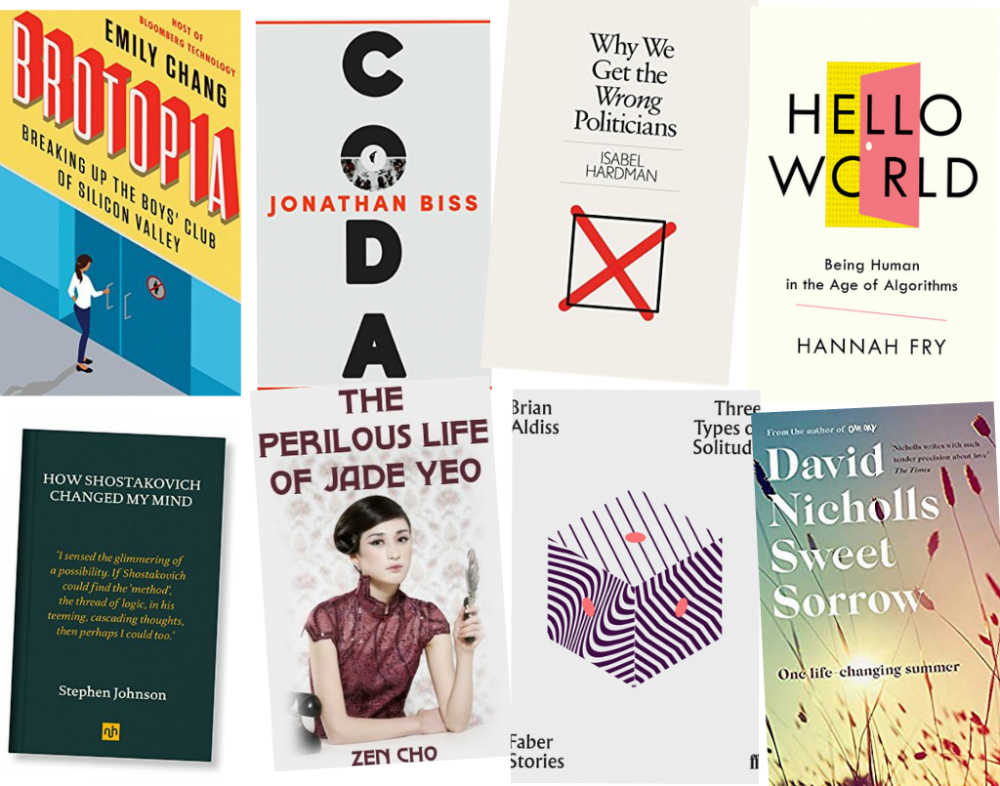What I’ve been reading this month

Maybe I’ve not been in the right frame of mind for reading this month, or maybe I’ve made some bad selections. Either way, nothing has really blown me away.
The blockbuster book of the summer, David Nicolls’s new book Sweet Sorrow, was a beautifully written story of teenage first love, set against a background of an interestingly complex family breakdown, and a (slightly tiresome) summer children’s production of Romeo & Juliet. Despite the evocative and often funny writing, it all felt a bit too long to me, and perhaps a little too saccharine, even by Nicholls’s standards. I didn’t feel as absorbed by the world of this novel as I have by most of Nicholls’s other books.
Hannah Fry’s Hello World was an enjoyable a well-written lay summary of the strengths and limitations of computerised algorithms as applied in real-world settings. I particularly enjoyed the concise clarity of the book combined with occasional wit. I didn’t personally feel like this book gave me much new insight to the topic, but I think that is a reflection of having read a reasonable amount in this area before, and this book being aimed at an audience perhaps newer to the topic.
Lots of friends have been praising Zen Cho’s The Perilous Life of Jade Yeo recently, so I thought I would give it a go. It was a fun romantic novella set in the late 1920s told from the point of view of a straight-talking young woman from Malaysia crashing up against the buttoned-up sensibility of folk in England. The central character was great fun, a really entertaining and endearing creation, but I found some of the language a bit uneven and perhaps a little anachronistic—or, at least, not in keeping with my expectations of the language of that era as someone who knows very little about it.
It’s hard not to feel a bit fed up of politics at the moment, but I nonetheless picked up Isabel Hardman’s Why We Get the Wrong Politicians. This was a sympathetic portrait of the work of MPs, arguing that they do a poor job of legislating partly because they spend so much time on casework clearing up the fallout of previous poor legislation. Sometimes, Hardman overdid the sympathy—”MPs do not needs the complex motor skills of a surgeon”, so it’s fine for them to drink taxpayer subsidised alcohol over lunchtime—and it made me wonder a little about her motivations. All things considered, I found this to be less analytical and solution-focused than I’d hoped.
In Brotopia, Emily Chang related deeply shocking experiences that women have had in Silicon Valley jobs, and made a compelling case for change. I would have liked there to have been more discussion of the underlying societal drivers for the appalling behaviour. I also felt that Chang’s concentration on viewing the lack of diversity in tech companies through the sole lens of sexism occasionally produced odd results. For example, there is a section where she talks about horribly racist groups on social networking sites, and her conclusion is that this would have been less likely to have been tolerated if there were more women in the company… which may be true, but perhaps other types of diversity in the workforce might have helped more. This book opened my eyes to a problem that I’ve probably paid too little attention to in the past; but I don’t think it was necessarily the best form of the argument.
I seem to be on a bit of a musical thread to my reading at the moment. I picked up Jonathan Biss’s Coda, a 30-odd page essay on his relationship with composers’ “late” works. I’d forgotten how well Biss writes, and I thoroughly enjoyed reading his clear and enthusiastic account, with some really inventive turns of phrase.
I found Stephen Johnson’s How Shostakovich Changed My Mind somewhat less engaging, but then it’s a very different type of book to Biss’s. This was a memoir that wove a tale of the influence of Shostakovich on Johnson’s life, from helping him through mental illness to getting him into music journalism. I felt I missed out largely because I’m not very familiar with either Shostakovich’s work or Johnson’s journalism, and there wasn’t much that this book could do to make up for that lack of background.
I also read one more book in the Faber Stories collection this month: Three Types of Solitude by Brian W Aldiss. I’m afraid this came across to me as three pretty forgettable bits of science fiction, which isn’t really my favourite genre to begin with.
This post was filed under: What I've Been Reading, Brian W Aldiss, David Nicholls, Emily Chang, Hannah Fry, Isabel Hardman, Jonathan Biss, Stephen Johnson, Zen Cho.